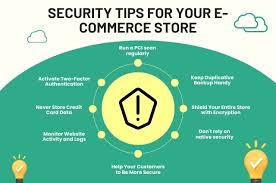
The safety of an ecommerce site in the highly expanding online business environment is a success determinant. When doing online shopping, customers expect that their personal and banking details are secured. Security breach may lead to loss of customers trust, legal implications and intense economic losses. It is thus the responsibility of companies to ensure that their sites are duly secured in order to retain customer assurance.
Enhancing the security of ecommerce websites is not just a topic of securing sensitive data but also a topical issue of the smoothness of the business functioning. The criminal activities may interfere with the services, harm the brand reputation, and relationships with partners, such as ecommerce fulfillment services working with inventories and order transportation. A safe ecommerce environment gives buyers and sellers a place of safety and leads to the sustainability of business.
Implementing Secure Protocols For Data Protection
Implementing secure methods of communication is one of the root measures in improving the security of ecommerce websites. By employing HTTPS instead of HTTP, one guarantees that the information between a web site and the client browser will be encrypted. The encryption also prevents unauthorized users in capturing sensitive data such as credit card numbers and log in details.
Ensuring data is secured when it is in transit is very vital, and even when the data is at rest it should be safe. Ecommerce enterprises ought to employ encryption that would preserve sensitive files in databases. This will provide an extra shield to prevent any possible breach, and it will take hackers longer to obtain the customer information even in the event that they break through the system.
Using Strong Authentication Methods
The procedure by which the authenticity of users accessing an ecommerce site is proved is called authentication. Weak authentication systems are prone to the attack by a cybercriminal leading to the unauthorized access of customer accounts and backend systems. To avoid this, ecommerce websites must deploy strict forms of authentication, including multi-factor authentication (MFA).
Multi-factor authentication involves allowing users more than one verification system, e.g. a surprise and a code on a mobile phone. A security component of this nature goes a long way in eliminating the chances of account piracy. The use of strong and uncommon passwords by customers and employees would also prevent some of the vulnerabilities arising as a result of password theft or guessing.
Keeping Software Updated And Patched
Ecommerce sites will have to depend on multiple software modules such as content management systems, plugins and third party applications. The vulnerabilities can be available in these software elements which can be used by hackers. Ecommerce businesses should enact an up-to-date system, which is applicable through software updates and security patches.
Timely updates overcome reputable vulnerabilities and enhance the security status of the web page. Failure to undertake such updates may expose the system to an attack like malware infection and data theft. To prevent such imperfections, businesses need to come up with a regular procedure on how to monitor the software updates and test the patches prior to their deployment.
Securing Payment Gateways And Transactions
One of the most sensitive components of an ecommerce operation is the payment processing. Encryption of financial details of customers when making transactions is vital in gaining customer trust and conformity to a regulatory industry. Safe payment gateways integrated by the ecommerce websites must be under highly secured security measures such as PCI (Payment Card Industry) DSS (Data Security Standard).
Encryption and tokenization are the methods that are applied to secure payment details to mitigate the threat of fraud through secure payment gateways. Tokenization substitutes the card data considered to be sensitive with special symbols of individual recognition which contain all the necessary data without undermining its security. Ecommerce operations are made safe and effective by collaborating with well-known payment processors to carry out transactions.
Protecting Against Common Cyber Threats
Examples of cyber threats that ecommerce websites can encounter are phishing, malware, and distributed denial-of-service (DDoS). Companies may also clash with phishing attacks that touch on customers through misleading emails, or websites that extract log-in information or payment details. Malware may enter into the systems and corrupt data integrity or availability.
As a counter measure to these threats, ecommerce companies ought to install holistic security suites like firewalls, antivirus and even intrusion detection systems. Firewalls provide delimitations between untrusted and trusted areas. The intrusion detection systems check network traffic against any suspicious activity. Security training of the customers and employees on how to identify phishing attacks and secure internet usage forms an important component of the security plan.
Ensuring Secure Hosting And Infrastructure
A basic requirement in the protection of ecommerce websites is the underlying hosting environment security. Selecting a well-known hosting company featuring high security would help evade any attempts at gaining unauthorized access to data and its leakage. Regular backups, secure data center and disaster recovery plans are important features to ensure that a site is readily available and generally has integrity.
The cloud hosting solutions may have scalable security and secure infrastructure with inbuilt protection of threats. Nonetheless, the ecommerce businesses need to ensure that their hosting company aligns with best security and compliance practices. The decision to stay in control of server settings and access control also enhances the security against the possible attacks.
Implementing Regular Security Audits And Testing
Evaluation of the security of ecommerce websites is done continuously to detect any weakness to be used by attackers. Creating security audits such as penetration testing and vulnerability scan would enable the business to investigate the effectiveness of their defense. These proactive assessments reveal weaknesses and guide improvements.
Penetration testing is conducted in a similar way as real attacks in order to identify a possible breach. Vulnerability scanning is fully automated checks of known security concerns in software and network elements. A combination of these mitigation strategies enables ecommerce companies to have a stronger security stance. Using third party specialists to conduct independent audits may offer up some valuable information and suggestions.
Backing Up Data And Preparing For Recovery
Despite best efforts, no security system is completely foolproof. Thus, data backup and disaster recovery plans are extremely crucial to ecommerce business. Systematic backup of important information like the orders made by customers, product stock levels, and financial records makes it possible to re-store such information should there be a cyberattack or software failure.
The information must be secured and preferably in different places to prevent it being lost through physical destruction or attack by ransomware. The recovery plan has to incorporate direct guidelines on how to get the organization back to business within the shortest time possible at minimum cost. During the recovery, collaboration with such partners as ecommerce fulfillment services may be essential as a way of preserving continuity in order processing and shipping.
Building Trust Through Transparent Security Policies
Ecommerce customers will trust most websites that are transparent in security matters. The open declaration of privacy and data protection policies and the way customers are treated in terms of data and information builds trust. The information on the websites about the security procedures must be available and the tools enabling the customers to manipulate their data should be easy to use.
Transparency is also applied in the timeliness of reporting security problems to customers as well as what is done in resolving them. This communication in good faith can reduce reputational losses and consolidate contacts with customers. Using the security commitment as a brand promoter can make a difference in distinguishing the ecommerce companies in an intensifying marketplace.
Educating Staff and Customers on Cybersecurity Best Practices
Even the most advanced security systems can be undermined by human error. Employees and customers both play a vital role in safeguarding ecommerce platforms. Regular staff training sessions on recognizing phishing attempts, handling sensitive data, and following secure login protocols can significantly reduce the risk of breaches. For customers, providing clear guidance—such as how to create strong passwords, identify suspicious emails, and avoid public Wi-Fi when shopping—can further strengthen overall security. Empowering all users with knowledge ensures that security is a shared responsibility rather than relying solely on technology.
Conclusion
Enhancing the security of an ecommerce site is an effort that needs to be undertaken on a broader and continuous basis in various places. This includes securing the data transmission and authentication, payment processes and protection of the data infrastructure and each aspect is critical to protect. Companies need to take active security challenges, invest in keeping systems maintained, and be ready to face potential catastrophes in order to protect their companies and customers.
These security practices should be vested in the system because they augment the stable operation of ecommerce systems and the customer trust. It is also beneficial to the partners in operation like a fulfillment service in ecommerce processing ensuring smooth processing of orders and their delivery. The safeguarding of the websites that ecommerce companies use puts ecommerce businesses in a more advantageous position to conquer the long term in the competitive online world.



